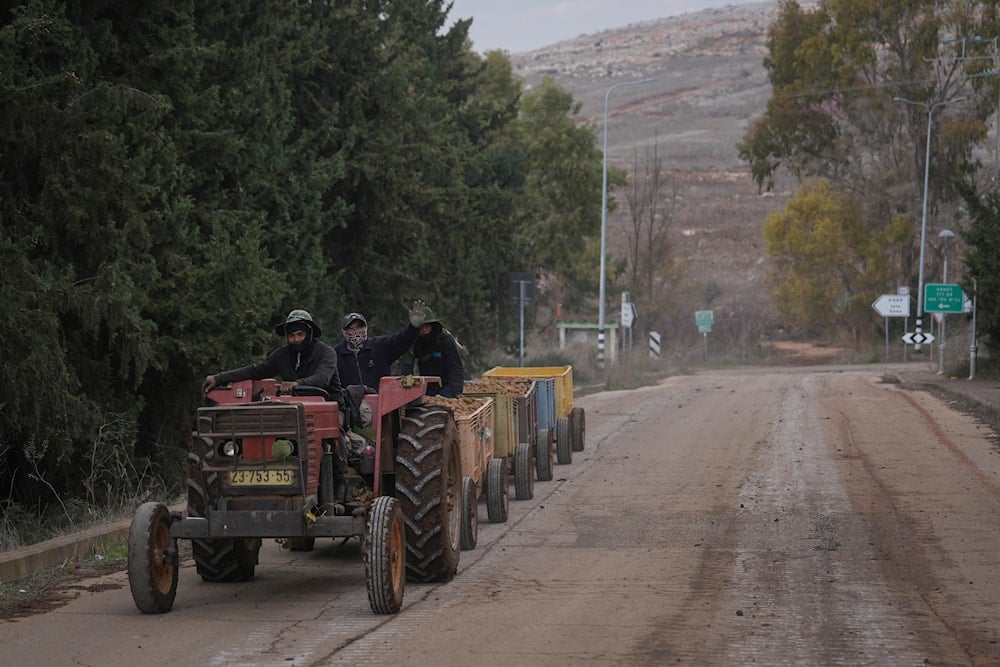Hezbollah attacks caused $108M in damages to Israeli agriculture
A report by ReGrow Israel report reveals that Hezbollah attacks since October 8, 2023, have caused over $100 million in damages to northern "Israel"’s agricultural sector.
-

Foreign workers ride a tractor outside the agricultural settlement of Avivim, next to the Lebanese border in upper Galilee, Occupied Palestine, Thursday Nov 28, 2024 (AP)
The agricultural sector in northern occupied Palestine is experiencing unprecedented devastation due to the ongoing conflict, with a recent report from the agriculture-focused nonprofit ReGrow Israel indicating that preliminary estimates of physical damages have exceeded $100 million.
The study found that from Oct. 8 until the ceasefire at the end of last year, thousands of missile strikes devastated key infrastructure, caused massive fires, and forced farmers to abandon their land, severely disrupting national food security, local livelihoods, and market stability.
"The damage in the north is much larger [than the South], more complex, over a much larger area, and probably higher damage, not only because of direct attacks and cyber attacks but also because of the longer exposure to war and abandonment," said Danielle Abraham, executive director of ReGrow Israel.
The report documented 9,000 direct missile, rocket, and drone strikes in northern occupied Palestine, along with over 10 cyber attacks, which collectively burned nearly 100,000 acres of land, while the extended deployment of Israeli military forces and supply chain breakdowns further intensified the crisis.
The report noted that within six months of Hezbollah's attacks on northern occupied Palestine, beginning on Oct. 8, 2023, an estimated 35,000 tons of fresh fruit and vegetables from the region were lost, representing 25% of the country's total food loss.
The report also stated that prices have sharply increased as a result, showing an 18% rise in vegetable costs and a 12% increase in fruit prices in early 2024 compared to the previous year, while over 60% of surveyed northern farmers reported farm damage and a quarter completely stopped their operations.
Abraham pointed out that most settler communities within the 0-6 mile range are agricultural, with 38 kibbutzim and 42 moshavim making up 76% of the 107 border-area districts, further noting the northern region contributes 10% of Israel's total agricultural output.
According to the report, the estimated damages include around $75 million needed to replant dead orchards, over $3 million required to restore destroyed vineyards, approximately $7 million in losses to infrastructure and cattle grazing pastures, and more than $23.5 million in damages affecting chicken coops within the poultry sector.
Since October 7, 2023, the Israeli economy has taken massive hits across several sectors and economic facets due to its wars on several fronts.
War devastates the Israeli economy
Moody’s Investors Service warned of "Israel’s" “very high political risks that have weakened economic and fiscal strength," Israeli media reported late March.
Moody’s said in a regular update report on the occupation entity’s credit rating that “uncertainty over Israel’s longer-term security and economic growth prospects is much higher than is typical, with risks to the high-tech sector particularly relevant, given its important role as a driver of economic growth and significant contributor to the government’s tax take."
The report noted that these negative developments could significantly impact the government’s finances and lead to further deterioration in institutional quality.
The Jerusalem Post reported on February 11 that "Israel's" economy continued to struggle in the second half of 2024, as its war on Gaza deepened financial instability and eroded investor confidence. According to the Bank of Israel's latest financial stability report, macroeconomic risks remain high despite minor improvements in credit and asset pricing.
The central bank's risk assessment, which evaluates the exposure of "Israel's" financial system to macroeconomic challenges, found that economic instability persisted due to the security situation. The report pointed to the war's impact on global perceptions of "Israel's" economy, affecting businesses, government finances, and borrowing costs.
The observations align with projections from the International Monetary Fund (IMF), which recently revised "Israel's" 2024 GDP growth forecast down to 0.7%, citing regional conflicts and heightened uncertainty as major concerns.
Despite a somewhat modest GDP growth following a contraction at the end of 2023, "Israel's" economy has yet to regain its expected trajectory.

 4 Min Read
4 Min Read








